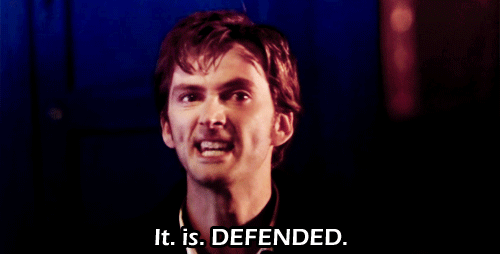There’s one phrase I’ve been using a lot, as I’ve been promoting my young adult space-opera Victories Greater Than Death: “Save all the worlds.” Because I love the idea of a group of kids who are mostly LGBTQIA+ and come from cultures all over the world get to be the ones to help “save all the worlds.” And I love space opera, with its huge space battles and giant alien objects and gonzo plots and, yes, the fate of worlds being at stake.
It’s not really a spoiler to say that the fate of the galaxy is at stake in Victories Greater Than Death. The same is true in Star Wars, Guardians of the Galaxy, Steven Universe, She-Ra, and frequently Star Trek. On Doctor Who, they frequently blow right past saving the galaxy and go straight to saving the universe. But I often see people online insisting that lower stakes make for better storytelling. I understand what they’re saying, and sort of agree up to a point — except that I love high stakes, especially in genres like space opera. And I think that it’s awesome when people who look like Tina, Rachael, Elza, Yiwei, Damini, and Kez get to save the galaxy, instead of people who look like Luke Skywalker.
[referenced id=”884133″ url=”https://gizmodo.com.au/2015/06/kids-can-finally-play-out-quints-death-scene-from-jaws/” thumb=”https://gizmodo.com.au/wp-content/uploads/2015/06/19/1302613169182137702-300×169.jpg” title=”Kids Can Finally Play Out Quint’s Death Scene From Jaws” excerpt=”It’s one of the more terrifying scenes in Spielberg’s thriller that made us all afraid to go in the water, and now kids can re-enact Quint’s death scene from Jaws whenever they want with this new playset from Funko.”]
I really do understand the argument against high stakes in storytelling. For one thing, the higher the stakes, the more abstract they’re likely to become. Whenever the Doctor saves the entire universe on Doctor Who, the problem quickly comes to seem extremely theoretical. If a kitten is about to be crushed by a piano falling out of a window, you can see the kitten and the piano, and you can yell at the screen “Nooooooo, save the poor kitty!!!” Whereas it’s hard to visualise the entire universe, and frequently “saving the universe” translates to “three people in a room talking about big stuff.”
As the danger becomes more abstract, too, it becomes harder to suspend your disbelief and buy into what’s going on. Unless you can see the actual peril — like with a “flash-forward” to a post-apocalyptic world — then you could be stuck telling us the universe is in danger, rather than showing us. The easiest way to work around this issue, incidentally, is to find a way to show the danger happening in microcosm. (Think of how Guardians of the Galaxy Vol. 2 shows Ego the Living Planet spreading his ego-sludge in two places: a small town on Earth, and an alien world, and then we trust that this is happening everywhere else, too.) Also, on a related note, there’s a danger that the higher the stakes go, the less you can focus on the characters. When the fate of untold trillions of people is at stake, there’s no time to worry about our personal shit — we have to get the doohickey into the thingamabob right now, or all is lost! This is probably why “saving the universe” on Doctor Who usually seems to involve a wedding or something similar. Spoilers for ten-year-old media: In Matt Smith’s first season, the universe is saved via Amy and Rory’s wedding, and in the following season, the Doctor saves the entire cosmos by marrying River Song.

That technique, of balancing enormous weighty matters in the background with easy-to-grasp human concerns in the foreground, is something I try to use a lot. Like in All the Birds in the Sky, I was pretty careful to introduce the “fate of humanity” stuff slowly and organically, letting it build over the course of the book while keeping the focus squarely on the relationship between Laurence and Patricia. By the end, everything is getting pretty epic, but their bond becomes even more central.
So why do I like high stakes? I already mentioned that I think it’s important to see the galaxy saved by people who don’t look like a Skywalker or a Captain Kirk. And I worry sometimes that all these discussions about avoiding fate-of-the-world storytelling mostly happen among people in my filter bubble, including a lot of folks from marginalised communities — white cishet men will continue to write about saving the galaxy no matter what, but the rest of us might just focus on writing stories about saving a kitten. (Note: I love kittens and don’t want them to be crushed by falling pianos.) But also, I love stories that are epic, and involve huge mysteries and Big Dumb Objects and ultimate weapons and, yes, unthinkably massive dangers. I feel like you can’t be a larger-than-life hero unless you’ve saved a ton of lives. And because all of this stuff is a metaphor for human experiences, a story about the entire world being at stake accurately captures what it feels like for a young person (or, really, anyone) to be struggling with huge intractable problems in your life. Not to mention that I love wish-fulfillment and escapism, and there’s nothing more fulfilling and escapist than getting to save absolutely everything.
Most of all, guess what? The fate of the world actually is at stake. In real life, we are in the final reel of a Michael Bay movie, or maybe a Roland Emmerich movie. If we don’t start addressing the harmful shit that we are doing to our planet’s climate right now (and, on a related note, addressing the spread of global authoritarianism and fascism), then we won’t have a planet to live on much longer. So I am here for stories that say that saving the world is possible, and is a good goal to have. We shouldn’t pretend that saving our world in real life will be as easy as it is in stories — we won’t just fix everything by putting the doohickey in the thingamabob — but it’s still good to have fictional examples of world-saving to inspire us.
Consider two time-travel movies released around the same time: The Terminator (1984) and Back to the Future (1985). Despite both featuring time travel, they’re about as different as two movies can get: one’s a dark thriller, the other’s a goofy comedy. Their time-travel storylines revolve around, respectively, an A.I.-driven apocalypse, and whether Marty McFly’s parents will hook up. But interestingly, they’re both about the question of whether a dude (John Connor or Marty McFly) will be born — which means that they’re both, in a sense, small personal stories about making babies. They both have a relatively small number of characters and settings, too.
In other words, the higher stakes don’t require The Terminator to have a more sprawling cast, or bigger set pieces, than Back to the Future. The action is of a similar scale, it’s just that the ramifications are different (and nobody’s directly trying to kill anybody in BttF). I love both of those films, and wouldn’t want either of them to adjust its stakes higher or lower. If The Terminator was about a killer robot coming back in time to prevent the birth of John Connor because John Connor will grow up to knock over some dude’s garden shed, it would lose a lot of its frisson. And if Marty McFly needed to make sure his parents boinked, or else the whole world would burn, the whole thing would be a lot less cute. (That said, I just finally watched Good Omens, which manages a similar cute tone, despite having just as apocalyptic a storyline as The Terminator. So it’s definitely not true that higher stakes = less humour.)
[referenced id=”1136492″ url=”https://gizmodo.com.au/2018/11/why-we-need-utopian-fiction-now-more-than-ever/” thumb=”https://gizmodo.com.au/wp-content/uploads/2018/11/08/r1arfmnzxfpdmdrtffau.jpg” title=”Why We Need Utopian Fiction Now More Than Ever” excerpt=”From the neon-drenched noir of Altered Carbon to the technophobic Black Mirror, dystopia is all over mainstream entertainment these days — and considering the current political climate, it’s easy to see why. But when was the last time you watched a utopian show or movie? Unless, like me, you’re watching Star Trek…”]
So how do you keep huge stakes from overwhelming your characters and emotions and all the juicy storytelling stuff? I don’t think you need to have an actual wedding, like those Doctor Who stories I mentioned, but it’s definitely good to have personal stakes in the middle of huge, universe-roiling challenges. Also, I think if you do it right, the huge stakes can make the small human stuff feel more epic, rather than less.
When I was writing and polishing the climax of Victories Greater Than Death, I found that the galaxy-in-peril business put more pressure on my characters, and amped up their emotions. When you’re about to go make a last desperate attempt to save absolutely everything, then all of your last moments together really matter. A lot. The whole “this could be our last chance to talk about what we mean to each other before we go into the stankiest armpit of death together” thing is real. And people tend to bare their souls in those kinds of situations. Meanwhile, if everything — everything! — is depending on the actions of a handful of teenagers, then every decision those kids make is major and vitally important. Each of their choices becomes a huge big deal, and their personal foibles and strengths could mean the difference between life and death for countless others.In Victories, Tina is struggling with a lot of questions about what it means to be a hero, and how she can balance her loyalties to her friends with her dreams of being an epic champion. All of those questions that Tina’s been grappling with become more essential, not less, when her decisions have much wider consequences.
I think high stakes in storytelling are like anything else: they can be done badly, or they can be done well. When they’re done well, they can feel emotional and huge and intense and super-personal. When they’re done badly, it’s not too dissimilar from any of the millions of cookie-cutter “You kidnapped/hurt my family, prepare to die” thrillers, like the flood of Taken copycats. A mindless, heartless plot-heavy story is the same, whether it’s about avenging your dead wife or stopping a nuclear bomb.
The main thing to worry about in a high-stakes story is the same as in any story: make us believe in the stakes and care about the characters.
